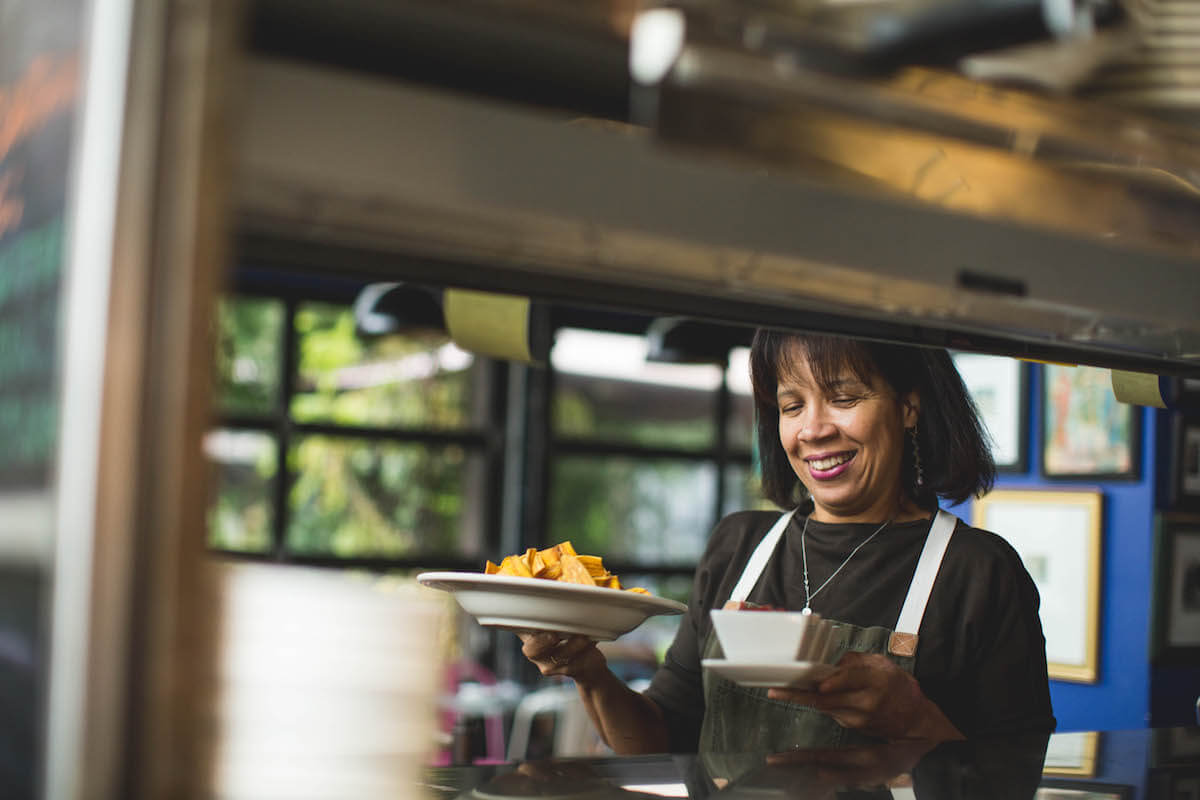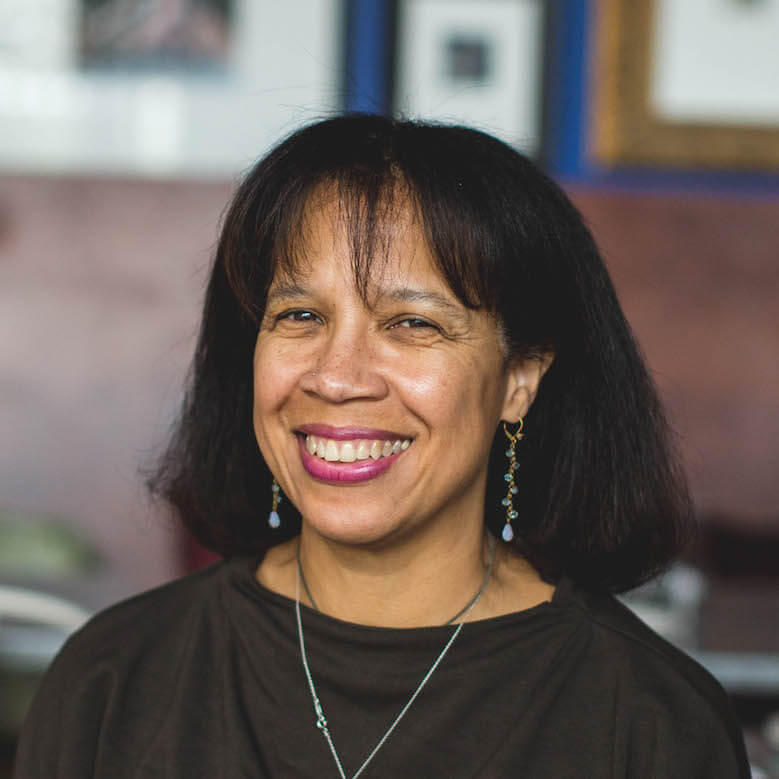Donna MoodieFounder
Donna Moodie is a restaurateur in Seattle, Washington originally from Kingston, Jamaica. She opened Marjorie in 2003.
Updated: April 7th, 2023


Donna MoodieFounder
Donna Moodie is a restaurateur in Seattle, Washington originally from Kingston, Jamaica. She opened Marjorie in 2003.
Employees
18
Founded
2003
LOCATION
Seattle, WA
Sometimes, the best model for a business is built on your unique self-expression.
Donna Moodie — who grew up in Jamaica and developed a love and curiosity for cooking ever since she saw her mom hosting dinner parties and diligently researching recipes — has a track record for running successful restaurants. She became a fixture of Seattle’s food scene in the early ‘90s before it had really blossomed, offering a menu of globally inspired dishes and a sophisticated yet funky ambience.
These first restaurants were built with her then-husband and business partner. She had the vision and abilities to run a restaurant early on, but after her divorce, Donna wasn’t sure if she wanted to stick with the grueling labor of the food industry. However, she realized that her love of cooking and hosting people remained—it was an integral part of her history, and it made her truly happy. She decided to take a risk and open a restaurant that was all her own, called Marjorie after her mother, who inspired her love of cooking and the community of people it brings together.
Besides the personal side of her story, there are all the dynamics of building a successful business: knowing when to take risks, learning from missed opportunities, and the persistent commitment it takes to refine the model. Below, we talk to Donna about the importance of self-expression in business decisions, about trusting your own vision (so long as you work hard to keep it going), and the importance of remembering where you come from.

My grandparents lived in Kingston, and my father was a manager at Appleton Estate, the sugar and rum factory in Cornwall, so we shuttled between the two. Then we moved back and forth between Chicago and Kingston into my teens.

How did you first get into cooking?

Mostly from my mom. We never really ate out, she was always cooking at home, and she always loved entertaining. We had a lot of dinner parties, and it wasn’t unusual to see my mom reading cookbooks and researching recipes. I have a recollection of her reading Mastering the Art of French Cooking, the Julia Child book, from cover to cover while sitting on the couch, over and over again.

What were some of the meals that your mom Marjorie would cook? What were your favorites

She was always curious about international food. She would cook Asian food, classic French dishes, classic Italian. There were certain Jamaican dishes that I think every Jamaican child loves, but when we moved to Chicago we couldn’t always get the ingredients. We would go to a little Jamaican grocer that was on the South Side and we would get them. Things like mashed green bananas, rice and peas, oxtail soup, cornmeal pudding with a coconut custard on top for dessert. When we could get fresh ackee, we’d do ackee and saltfish.

You got your love of cooking from your mom—where does your entrepreneurial spirit come from?

I’m not sure where I get it from. I’ve been told I’m very much like my father but I didn’t know him very well. He was a manager for a major rum company, which I suspect, in the sixties and seventies, wasn’t as corporate as it is now. So, thinking about it and from looking at pictures, it seems like he had a lot of freedom, and an entrepreneurial spirit. He liked doing his own thing, and I think I get that from him.

Tell me about the process of starting your first restaurant, Marco’s Supperclub.

My ex-husband and ex-business partner Marco and I met at a restaurant in Chicago. We moved to Seattle thinking we would open up a restaurant. The first thing we did was get familiar with the city. We had our life savings that we were going to use, but didn’t want to drain money, so as we were looking for a space we also worked and spent time getting to know things. I think Marco would have opened up more of a classic, European bistro, but I suggested we do something with more funky dishes and a mismatched silverware sort of style. A lot of it was luck and the timing was right—it was the early nineties—but it made it stand out. It got a lot of local and national attention at a time when there weren’t a lot of new restaurants.

What was the experience of opening Marjorie like? How was it different?

After Marco and I split up, I wasn’t really sure if I wanted to stay in the food business. Once I decided to stay, I thought, “I want to go back to my roots. Get back to what I love about the food business and entertaining,” and that’s where the name and the inspiration for the menu came from. It was different in that I think I took more risk, and it was more a product of my personality. When I walked in, it felt like I was entering my home.

How did you raise the startup capital?

It’s interesting. We started our first place with our life savings, and then from that we always had a little bit of our investment returning. When I did my own restaurant, I wanted to do such a major overhaul that I ended up taking out a small business loan. I probably would have had some return on that, but I had a funny lease situation so I wasn’t able to sell my business. So the one that I have now, I literally had customers who said “We really like what you do, here’s the money to open up your next place.” I looked for it a little bit, but I didn’t look very hard.

Looking back on the early days of Marjorie, is there anything that you would do differently?

I think, hindsight being 20/20, you could make a list of 100 things you would do differently. Maybe be a little bit more conservative; audition chefs a little bit more diligently. Maybe I would have taken a longer break before opening. It’s such an intense thing, having your own business, especially a restaurant since the workload is so extreme. I would have also taken a class to have a bit more information, it would have been nice to know more about human resources, the backend of business, and more strategy.

Who are your guests?

I have a lot of personal friends, neighborhood customers, business clients. We have a really cool group of regulars I feel fortunate for. It’s a community of people that support the restaurant.

What’s the most difficult part of running Marjorie?

How hard you work. And how many different types of people you have to manage. More so than other industries, we attract a creative personality, and sometimes it feels like you’re herding cats when you’re dealing with 14 different types of people, making sure that everyone gets along. People who are attracted to the food industry are a little more manic in their energy, so it’s about keeping the flow of energy really positive and productive.

What’s the best part?

The best part is that I’m able to do something that I’m really passionate about. I’m around food, wine, and things that are crafted and handmade. I get to see people on a regular basis, and I get to have an impact on their mood and their life. Not in a big, big way, but I believe if you create a nice experience for someone and they leave feeling positive, then you do have an impact on your community. Also, if you’re able to support certain organizations and movements, you also have an impact in that way too.

You now offer Miss Marjorie’s Steel Drum Plantains as a product, what was the process like for getting it off the ground?

It was a little spontaneous; we had never done anything like that. I’ve been doing it in steps; the first step was going to specialty food shows and seeing what the foods were like and what other products were out there. The next year I worked on what the package and branding would look like. The third year we had the goal of just getting it into a few stores. This year, the goal is to have more of a national profile.

What did you have to learn in order to launch the product?

I’m learning as I go along and try to talk to as many people as possible. That’s basically how I’ve been approaching this. I’ve definitely made some mistakes, and I’ve learned a lot, but I think that having the restaurant umbrella made the process more fortunate.

So it was more of an organic process.

You start things like that and you go into it not knowing what kind of a direction it’s going to go in. I think the best way to describe it is that entrepreneurs sometimes need to be a little flexible. What makes a good entrepreneur is how you react. I’m doing this project, but I’m not so set in what I expect from it that I can’t make move in a different direction when something comes at me.

How do you envision your business looking in 5 years? What’s your long-term outlook?

I’ve actually been thinking a lot about this these days, because I feel like I’m in a changing industry right now, much in the same way that newspapers when through it a couple years ago. I think that the plantains might drive some of that change. I’m wondering, instead of the plantains being integrated into the restaurant, the restaurant might be integrated into the plantain production. What I’ve been envisioning is something that’s more commercial kitchen. Maybe it allows other small businesses to integrate a product; maybe we do dinner several nights a week but not seven nights a week. We might incubate up-and-coming restaurant people who want to do a pop-up or nurture an idea. It could be so many things.
What’s one book every entrepreneur should read?
Small Giants: Companies That Choose to Be Great Instead of Big
One brand that your admire:
Pedshoes.com
5 favorite independent businesses in Seattle?
Michael Jones is a Senior Editor for Funding Circle, specializing in small business loans. He holds a degree in International Business and Economics from Boston University's Questrom School of Business. Prior to Funding Circle, Michael was the Head of Content for Bond Street, a venture-backed FinTech company specializing in small business loans. He has written extensively about small business loans, entrepreneurship, and marketing.


Funding Circle
Where in Jamaica did you grow up?